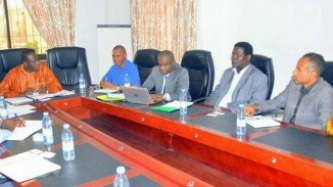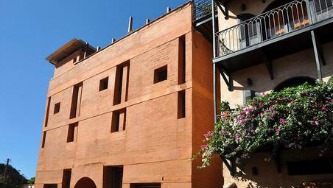

Swiss Partners
Amstein + Walthert AG,
www.amstein-walthert.ch /
mandu – architexture & urbanizm, Mandu dos Santos Pinto
Project Type:
Technology:
Country:
Project Status:
Project Start:
End of Project:
Contract:
Documentation
Swiss Contribution
The Swiss planning and consulting company Amstein + Walthert AG has many years of experience with planning and consulting services in fields such as energy efficiency, water, facility management, construction ecology, construction physics, sustainable development. The Swiss architecture and consulting firm mandu – architecture & urbanism has good knowledge within the urban African context, valorization of informal quarters, local materials and renewable energies and is coaching projects in Angola and Senegal.
Description
The pilot house project “oua_casa | maison urbaine africaine,” is a house concept integrating local materials and renewable energies, which proposes a sustainable construction technique for the urban African context.
During a pilot phase, there shall be 2-4 energy efficient, sustainable pilot houses built in Dakar; having a demonstrating character for African cities. Local recyclable materials, such as the traditionally established loam, will be used, which is rooted in local know-how. Additionally, calling these houses “plus energy houses,” renewable energies such as photovoltaic and solar thermal will be applied. Rain water and waste water will be used to reduce consumption of drinking water. These “oua_casa“ houses are low-tech plants and should be around 25% cheaper than standard houses. Consequently, they should be more affordable for lower social levels than corresponding standard constructions. The project is structured in two phases; a pilot phase and multiplication phase, the first one being this REPIC project. The multiplication phase for the construction of 300-500 more pilot houses will be prepared through corresponding communication activities and a broad supporting body with local partners. Feasibility of biogas plants for cooking and electricity demands will also be evaluated during the pilot phase.
The aim of the project is to promote sustainable construction techniques as well as renewable energies and this serves as well for developing new markets.